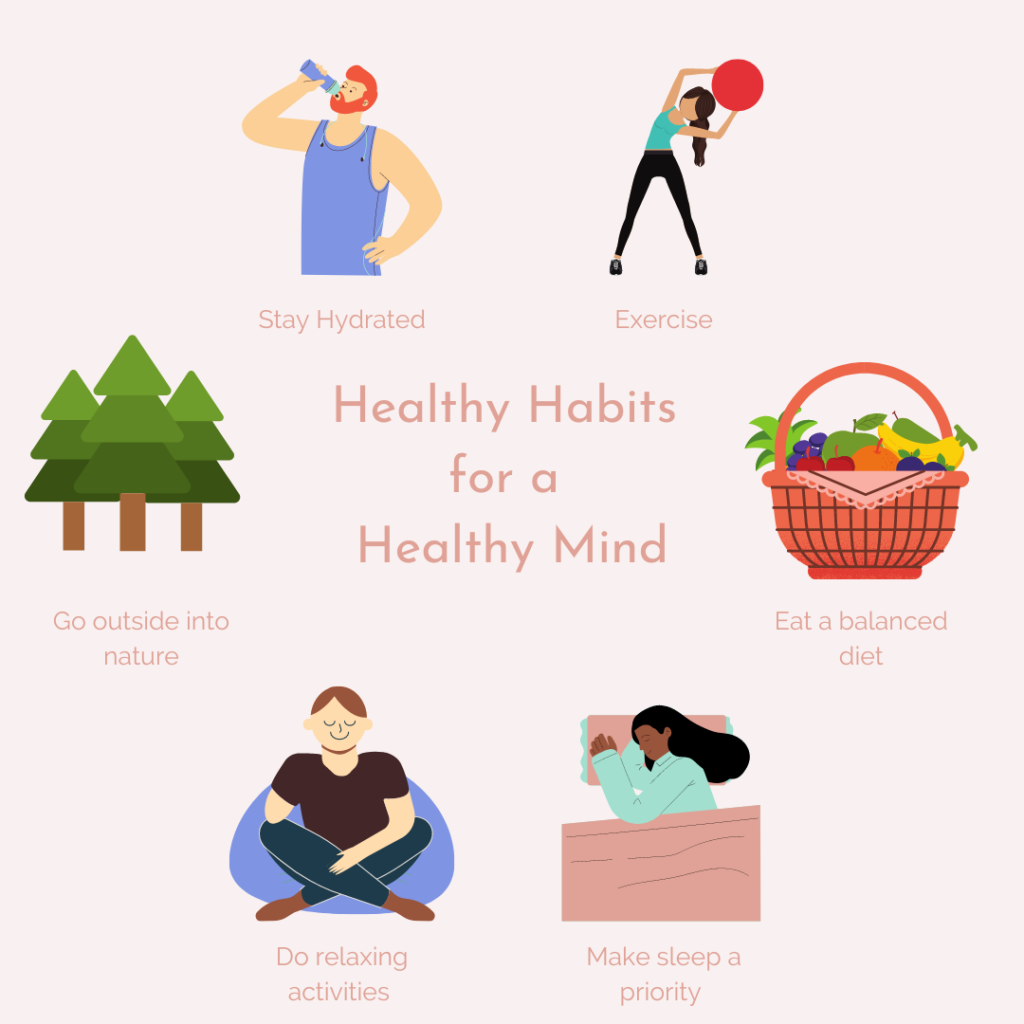Basic lifestyle changes and healthy habits can have a really positive effect on your mental wellbeing. As well as your overall being. I know for me when I went through a very dark time with with post-natal depression after my first baby, many of the below habits really helped me in my journey to recovery.
The following habits are also great preventive tools. Helping you keep you mind and body healthy and lowering the chance of you developing a mental illness and even a physical illness too!

Research shows that people who exercise regularly have better mental health and emotional wellbeing, and lower rates of mental illness. Exercise reduces the risk of developing mental illness. It also helps in treating some mental health conditions, like depression and anxiety.
This can be due to a number of reasons. When you exercise your brain produces feel-good hormones such as serotonin and endorphins and lowers stress hormones. Exercise also helps you have a better night’s sleep, which is another important factor in mental wellbeing. It can improve mental awareness and energy levels, giving you more sense of control. It reduces muscle tension, helping you feel more relaxed and less tense. And it can be a healthy outlet for frustrations.
You don’t need to go to the gym every day or do a high-intensity workout (unless you want to), It can simply be going for a walk every lunch, or going for a swim, run or yoga. Whatever suits you.
Research shows that drinking enough water can reduce the risk of depression and anxiety. And even mild dehydration takes its toll on our health. Your brain is 75% water and depends on hydration to function optimally. So it is no surprise that dehydration can cause your brain’s physical, hormonal, mental and emotional processes to weaken leaving you in a low mood and lack of energy. So try to stay hydrated by drinking 2 litres of water per day. A pint first thing when you wake is super beneficial for your brain after a long stint of no fluid. And drinking a pint half an hour before a meal will help your body to better absorb nutrients.
The mind has a very close relationship with the gut, this is called the gut mind connection. So what you eat has a direct effect on your mental, physical and even emotional wellbeing. Take small steps to improve your diet. This could be cutting out a sugar in a tea. Limiting the cups of coffee you have a day. Swapping your evening sweetie binge to having a sweet smoothie. I will write a blog soon going deeper into the mind-gut connection and how you diet can impact your wellbeing.
Establishing a good bedtime routine and having a good night’s sleep is so beneficial for your mental and physical wellbeing. If you struggle with sleeping you could try to cut out caffeine past 2 pm, avoid eating 3 hours before bedtime. Shut off all screens an hour before bed. Put a few drops of Lavender essential oil on your pillow, listen to wind down sleep meditation or write down all your thoughts and worries on a piece of paper to quieten your mind. The diagram to left shows how a lack of sleep affects your mental wellbeing.
Making time to do relaxing activities such as meditation, reading a book, deep breathing exercises, walking, painting/drawing, getting crafty, sit in nature can help take your body out of fight and flight mode which causes stress and overwhelm and activates your parasympathetic nervous system putting you into rest and digest. This state produces a calm and relaxed feeling in the mind and body and reduces stress and anxiety and helps your body to release toxins and repair cells.
Nature is vital in keeping us emotionally, psychologically and physically healthy. When it comes to mental health benefits, nature has a very wide definition. It can mean green spaces such as parks, woodland or forests as well as blue spaces like rivers, wetlands, beaches or canals. It also includes trees on an urban street, private gardens, verges and even indoor plants or window boxes. Surprisingly, even watching nature documentaries has been shown to be good for our mental health. This is great news as it means the mental health benefits of nature can be made available to nearly every one of us, no matter where we live. So you can go out for a walk, sit in nature, grow your own indoor plants or do gardening to help prevent mental illness or use it as a tool for recovery or coping strategy.
How are you doing? If you’ve been feeling more down, overwhelmed, worried, or stressed recently talk to someone, weather it’s a friend, family, stranger or a Doctor. Don’t wait until things become overwhelming, talking early can be a massive help.
If you think you may be starting to experience depression or anxiety, here is a self-assessment quiz with the NHS to help you better understand how you have been feeling – Depression and anxiety self-assessment quiz.
Mental health issues can come on very gradually and you may not even notice you have one, so if you have been experiencing any of the following over the past two weeks please contact your GP.
Subscribe to receive a replay of my 90 minute workshop. Includes guided meditation & Energy Audit worksheet.